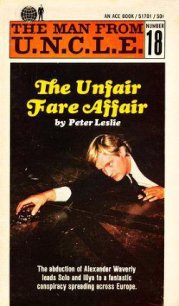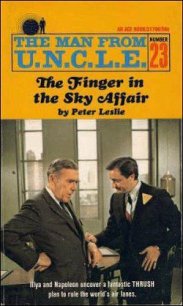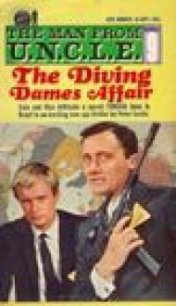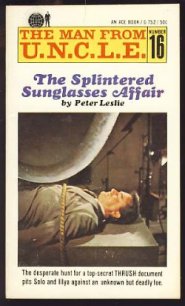The Radioactive Camel Affair - Leslie Peter (е книги txt) 📗
“Certainly. Mind you, ‘reasonable’ resources are pretty astronomic by ordinary standards. But if they had the means, and a sufficiently isolated place, and the labor, and some way of getting equipment and material there; if they had all these things—and they’re big enough ‘ifs’ at that, gentlemen—then I guess it could be done.”
“They couldn’t make it without the Uranium 235, though?”
“Definitely not. Not unless funds were virtually unlimited and they’d been working on it for years. You see, first of all you have to get your Uranium ores. Then you have to extract and refine pure Uranium. Then the 235 isotope has to be separated from the natural Uranium in a nuclear reactor—and the yield is minimal: only seven-tenths of one percent. When you add to this the cost of the raw material, the cost of the plant, the time, the cost of the immensely thick shielding needed—”
“Quite, quite,” Waverly interrupted. “I think you’ve made your point, General.”
“I mean, sure, they could get their deuterium, their heavy hydrogen, their cadmium and their graphite moderators easy enough; they could build themselves a reactor—”
“Why Uranium 235, though?” Illya put in, coming to the rescue. “I thought Plutonium was preferred nowadays.
“Why bother when you’re stealing it anyway?” Forster said laconically. “I guess maybe security’s even tougher on Plutonium—or perhaps the guy masterminding the deal has some reason for preferring the other isotope.”
“Yes, well, the point is, it’s 235 that’s been stolen and accumulated,” Waverly said hurriedly. “And what we have to do is track it down and find out where it’s going—and why.” He had pulled another pipe from his pocket, a short-stemmed cherrywood, and was absentmindedly filling it. The briar lay unsmoked on the table. He rose abruptly to his feet and moved to the projector.
“If I may hold the floor for a moment, gentlemen,” he said, “I will tell you the little we have been able to find out so far…”
Chapter 2
A Message from the Dead
“SOON AFTER THE CIA and the Pentagon had referred this matter to us,” Waverly said oracularly, switching on the projector and standing like a lecturer by the bright rectangle of blank screen, “we had a break: M15 in Britain reported a further theft of 235—from Aldermaston this time. But on this occasion they had a lead. You remember Martens?”
“The physicist who went over to the Communists while he was on vacation in Czechoslovakia last month?” Illya said.
“That’s the one. Apparently his nerve broke after he’d taken the stuff and he tried to seek asylum in Prague. But the Reds weren’t having any and they handed him back—which seems to confirm they had nothing to do with he theft. Anyway, he comes up for trial in two or three weeks’ time…But in the meantime his wife had found out something and contacted Scotland Yard. So when Martens was handed over, they had discovered the theft and knew what questions to ask. He only knew one contact, of course, but it was a start: they didn’t recover the isotope but they were able to trace it to Marseilles.”
“And the contact?” Solo asked.
“Unfortunately, he met with an accident,” Waverly replied dryly. “Apparently he fell under a train…”
“That’s typical Thrush stuff—stop them talking at all costs.”
“Yes. Anyway, with the information we received from Interpol, we felt we ad enough to start something. I sent Devananda Anand to Marseilles.”
Forster, the CIA man, cleared his throat again. “You’ve had reports from him?” he asked eagerly. “He’s on to something?”
“We’ve had… messages. No reports as such. A piece of film, a tape, a piece of paper. Obviously they were onto Anand, close behind—and presumably he was too closely watched to use any of the normal channels to report properly.” Waverly started the projector. Anand’s cover was as a newsman seeking colorful feature material for a syndicate. He managed to airmail one small can of 8 mm color stock purporting to be samples of the kind of pictures he was able to offer. Of course it’s in a kind of visual code, in case it fell into the wrong hands.”
Letters and figures whirled across the small screen. Then suddenly it erupted into a blaze of light and color. A line of camels walked slowly in silhouette across a skyline of ridged dunes. There was an abrupt cut to a close-up of a revolving postcard stand outside a tourist souvenir shop. The gaudy photographs spun slowly to a halt and the camera tracked in and picked up a card showing a harbor scene against an improbably blue sky. Another cut was followed by a second view of camels against a background of storm clouds and minarets. Next came a street scene—the conventional Casbah shot: a crowded alleyway with brightly colored stalls at each side and a throng of veiled women and gesticulating men in robes. The camera panned along one side of the street and held a booth displaying Arab hardware—row upon row of copper pans, pots, beakers and other containers. Then the camels once more: a medium close-up of Arabs loading bales of merchandise onto three dromedaries. This scene was double-exposed at the end, the later shot emerging as a crossroads outside a mosque. Under a purplish, dusky sky, a signpost stood in the foreground. On it was written in French, English and Arabic BABH EL GAZZABA—235 KM. A final shot showed camels yet again: a long caravan winding into a picture-book sunset. Then the screen was blank once more.
Waverly switched off tile projector. “That seems fairly clear to me,” he said. “What do you make of it, Mr. Solo?”
“Camels,” Solo said with a grin. “They come over loud and clear, don’t they? Camels going to wherever that harbor on the postcard was—”
“We’ve identified it. It’s Alexandria.
“Camels on their way to Alexandria, then. I’m not too sure if the Casbah street scene is significant, but…”
“The hardware shop must be,” Illya interjected. “All those metal vessels…couldn’t they imply canisters? Remember, it was followed by a shot of camels being loaded.”
“Yes—I guess you’re right at that! And the signpost with the figures 235 just in case we missed the point. I don’t think the place it pointed at was relevant…So we have camels loaded with a canister or canisters of Uranium 235 on their way to Alexandria, then. That figures. But on their way to Alexandria from where…?”
The film was taken in Casablanca,” Waverly said. “Anand sent a tape commentary to go with it by another plane. Most of it’s just cover stuff, of course, but there’s a message there as well.” He crossed the room and switched on the recorder in the recess by the door.
“As I stand in the native quarter of this age-old city—the international melting pot where east meets west and plots a coup d’etat—it is difficult to resist a twinge of alarm at the evidence of the twentieth century’s encroachment on centuries of tradition…” The soft Indian voice with its characteristically rolled r’s filled the room. “…Listening to the cry of the Muezzin as it wavers at dusk across the domed roofs and mud walls of the old town—”
Anand’s voice stopped as Waverly switched the machine off. “That’s a prearranged cue,” he said. “From the word ‘wavers’ onwards, it’s a message for me.” He ran the tape back a couple of revolutions and pressed the plunger again.
“…Muezzin as it wavers at dusk across the domed roofs and mud walls of the old town, one cannot help wondering where this modern age, this nuclear era, is leading Africa. Habib Tufik has run a coffee shop in Casablanca for forty years—and, if anyone has a finger on the pulse of North Africa, he has. But the things he told me of the impact of progress on this historic town are disquieting. The angular lines of this ferro-concrete block of flats are anything but wavering, for example, and yet despite their convenience, the Arabs shun—”




![[The Girl From UNCLE 04] - The Cornish Pixie Affair - Leslie Peter (электронная книга .txt) 📗](/uploads/posts/books/56865/56865.jpg)